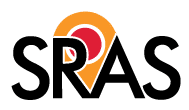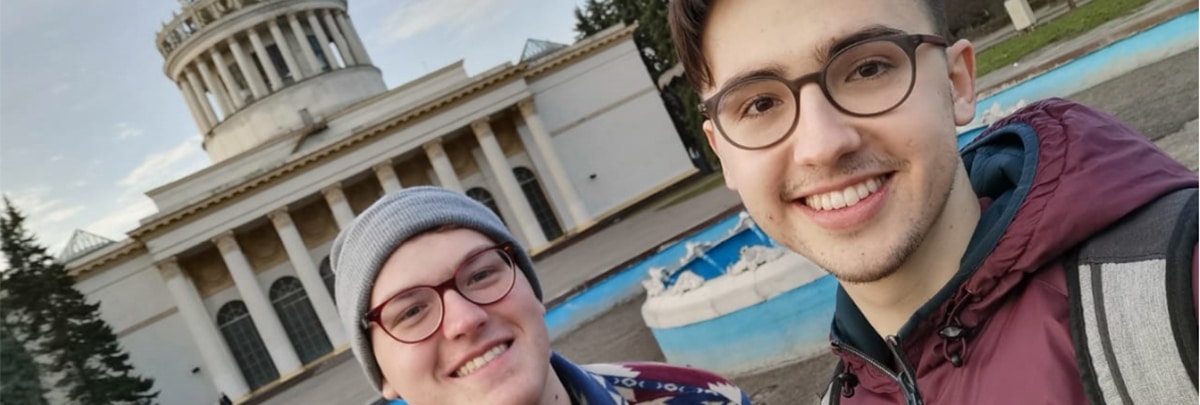Native Peer Tutoring
Regular practice speaking with native Russian speakers is a great way for students learning Russian to overcome language barriers, accelerate learning, and develop more natural speech skills. Speaking with young Russians is a great motivator as students are generally interested in getting to know their peers abroad and learning about their lifestyle. The more voices a student can hear, the better – whether in or out of the classroom.
SRAS’ new peer tutor program can help your class achieve this online. Peer tutors will bring their country and culture to your students. Peer tutor experiences can also jump start students’ potential future programs abroad, preparing them for life on the ground and giving them greater focus in making the transition abroad.
Who are SRAS Peer Tutors?
SRAS peer tutors are native Russian speakers. They are university students or are working professionals just starting their careers. Many live in St. Petersburg or Moscow, but some are from other regions of Russia, too. They enjoy speaking about topics ranging from movies to music to reading, cooking, sports and everything in between – just like students in the U.S. All peer tutors are eager to both share Russian culture and learn about U.S. culture.
What kind of training do they have?
All SRAS peer tutors have been screened by SRAS staff. Peer tutors have been coached in working with US students, including navigating important cultural differences and building students’ confidence. They have been trained on how to effectively correct mistakes and focus on fluency while engaging in realistic, meaningful conversation. All tutors have some previous experience in interacting with Americans or other non-native speakers. About 50% of the tutors are currently training to be teachers of Russian as a foreign language, so they have a particular interest in furthering their skills and knowledge through such relevant interaction.
Do they speak English?
Most tutors speak some English. However, peer tutors know that their task is to give students a chance to practice and improve their Russian of the Russian culture. For language-oriented sessions, English might be used sparingly to move a conversation along, or help clarify something a complicated topic. For sessions with beginner students or those focused on culture, the core interaction may be in English, but with language learning moments integrated.
How does it work?
As with everything SRAS does, it’s flexible. See below to see if one of the several models listed will meet your goals. Or, we can gladly discuss custom arrangements if you have a specific idea in mind. As students and peers are in different time zones, scheduling needs to be flexible as well on both sides. We recommend that you make this program a required part of your class and make it clear that the student is responsible for making and keeping session appointments. Students will join an SRAS-created WhatsApp group to connect with peers and set appointments. For individual meetings, nearly any platform can be used – including WhatsApp, Skype, FaceTime, Zoom or other audio/video tools that both agree on. We try to not to over-structure the arrangements so as to keep it organic and interesting for all involved.
Documentation happens on both sides in a simple google doc. Students will track with whom they spoke, when, for how long, and about what. Peer tutors do the same – tracking the student, university, date, duration, topic, and general notes about the session.
For maximum effectiveness, we suggest that a group and their assigned peer tutors do a moderated group introductory meeting. SRAS will arrange this to ensure everyone gets off to a great start.
Peer tutor models
Mini Session: Basic Speaking Assignments
Students complete simple speaking tasks on specific topics. For instance, students might introduce themselves, discuss their hobbies, ask for information from their tutor, etc. These well-defined, simple sessions last about 15-20 minutes each.
Full Session: Extended Speaking Assignments
Students with growing abilities will complete more challenging, flexible speaking tasks. Students might focus on vocabulary building on a specific topic. News articles could be discussed. Collaborative videos might be produced. Or maybe a long and stimulating conversation will be had. These interactions will be about 30-50 minutes each.
Asynchronous Online Discussion
Students can participate in an online discussion board with peer tutors to practice their writing skills and learn interesting cultural information at the same time. Peer tutors and students answer a question on a given topic and engage in asynchronous discussion threads. It’s motivating to practice writing when engaging in “conversation” with a peer. Tutors’ posts also model writing for students. Another approach is to engage in email exchanges on a given topic if the task at hand is to practice writing specific kinds of letters such as requests, complaints or recommendations – it’s one thing to write a letter and turn it in for homework, quite another to send it to someone, get a real response and have to send a follow-up reply! For more speaking and listening practice, audio or video asynchronous discussion boards are a possibility, as well.
Tutoring Session
Peers and tutors will agree in advance on a specific language aspect to cover. This might be challenging grammar or pronunciation issue or developing listening or even reading practice. Peers will be chosen specifically for topic and student level. They will prepare focused lessons in advance. These can be perfect for students who have missed a class session to make up the work effectively and with guidance. For consistency, repeat tutoring sessions should be held with the same peer paired with the student. A single interaction is about 30 – 50 min.
Contact Us
"My students are LOVING the poboltaem sessions."
- Yvonne Howell, University of Richmond
"I think they’re very useful overall. The content of the sessions themselves overlaps well with the class materials - it definitely improves comprehension. I enjoy them because they’re a nice change of pace from the usual class environment"
- Student, Stetson University
"I think this project is fulfilling my main goal – to get my students to overcome their psychological barrier of speaking and get reassurance that they can indeed can sustain a rather long conversation with a native speaker. I could see that they are more comfortable speaking and expressing rather complex ideas despite the grammatical mistakes, which, however, do not hinder the communication of the message."
- Tanya Ivanova-Sullivan, University of New Mexico
"It is wonderful to see how many important and interesting discussions, workshops, courses, and virtual excursions SRAS has organized during the pandemic. I know our SLI alumni [at University of Pittsburgh] have been in attendance at some of them and are full of praise for their educational value!"
- Kathleen Manukyan, University of Pittsburgh
"I love them so much! We get to practice our speaking and listening skills with so much one on one dialog, and I always find that I pick up some new unique vocabulary after each one. They also help to really cement the lab work into our heads because they always seem to be connected to them. I also like the challenge of it because we really have to wrack our brains to think of so much on the fly combining recall with active learning to talk and answer questions."
- Student, Stetson University

